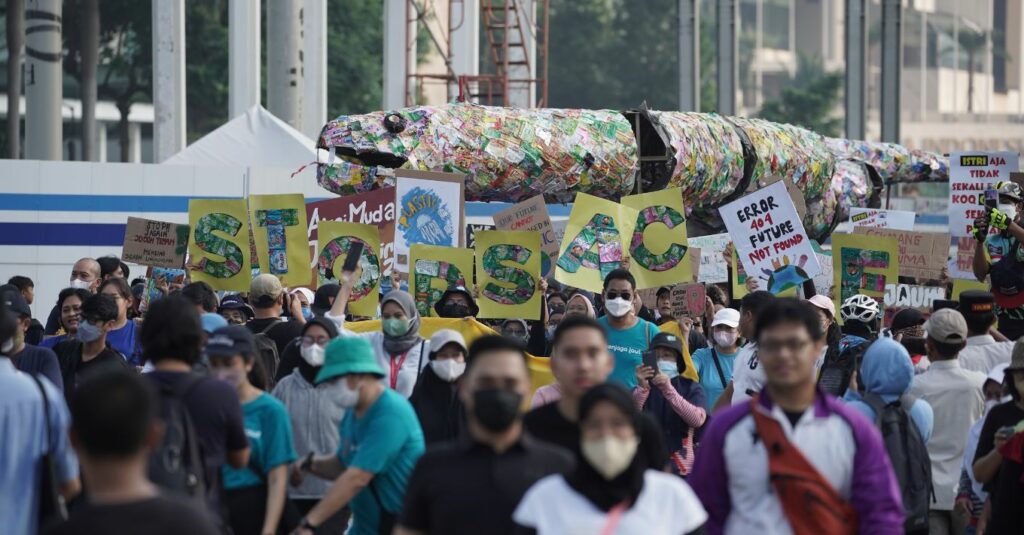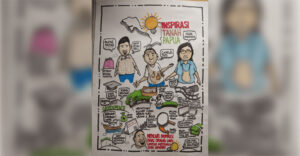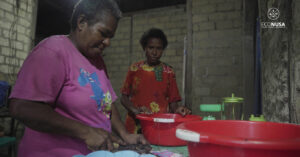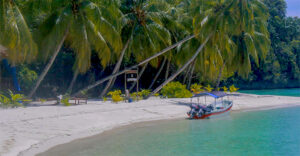
Plastic waste has now become one of the largest antagonists to both land, sea, and aerial environment. Data from the Ministry of Environment and Forestry shows that as from 68.5 millions of the total waste in Indonesia in 2021, 17 percent or 11.6 million tons is plastic waste. As of the amount, at least only 9 percent is recycled, and the rest pollutes the environment.
“Plastic is a way that delivers us to extinction and thus it must be stopped and change it into more eco-friendly alternative. Never let plastic monster destroy our future,” said Bustar Maitar, EcoNusa CEO, in his oration during the Plastic Free Rally on Sunday 24 July 2022 in Jakarta.
The Plastic Free Rally is an initiative that has been driven by the Divers Clean Action, EcoNusa, Indonesia Initiative for Plastic Bag Diet, Greenpeace Indonesia, Indorelawan, Pandu Laut Nusantara, Pulau Plastik, and Walhi Nasional since 2019. After two years with online activities during the pandemic, this year the rally was held offline.
Read Also: Plastic Waste Remains Serious Threats to Marine Life
One of the activities during the rally here was brand audit in search of the producer of various kinds of single use plastic that contaminates river, beach, and sea in Indonesia. The event was performed by 231 volunteers of Plastic Free Rally in June 2022 at 11 spots at the Indonesian beaches.
Swietenia Puspa Lestari of the Divers Clean Action explained that based on the brand audit, it shows three major producers of fast moving consumer goods (FMCG), namely Indofood, Unilever, and Mayora Indah, as the top contributors of single use plastic that pollutes environment. “The Plastic Free Rally found sachet as the largest single use plastics or 79.7 percent of the total plastic waste found,” said Swietenia.
The FMCG business is one of the major contributors in plastic waste crisis today. The plastic wastes polluting environment come from sachets of various size products they marketed. Greenpeace report Throwing Away the Future in 2019 mentioned that Southeast Asia had around 50 percent market shares and was predicted that the number of sachets could reach 1.3 trillion in 2027.
Read Also: Beach Cleanup and Plastic Monster Fascinate GTRA Summit
The Plastic Free Rally this year articulated and called the FMCG producers to be responsible for the single use plastic waste, particularly sachets products that have contaminated environment. Representing public, the initiative called the companies to be open to its waste reduction plan with full commitment of implementation. Above all, the government is also expected to take a stern measure to the companies producing the single use plastics to be responsible for the plastic waste from their businesses.
“The role of FMCG producer to take parts in the crisis of single use plastic waste is very crucial. Public effort to reduce single plastic is not enough when the producers do not cut down the single use plastic,” said Abdul Ghofar from Walhi Nasional. The government has issued Environment and Forestry Ministerial Regulation No. 75/2019 on the Roadmap of Waste Reduction by Producer to prompt the plastic producers involvement to tackle in plastic waste crisis in Indonesia. The government obliges producers to create a roadmap of waste reduction up to 2030.
The Plastic Free Rally here was followed by 200 volunteers across from various institutions and communities. Holding the posters of their aspiration, the volunteers walked along HI Roundabout to Dukuh Atas with snake-like monster made of plastic sachet. The installation was made by volunteers from various sachets that had been collected from the series of Plastic Free Rally activities.
Read Also: Microplastic and Plastic Waste Threatening Life
The snake monster represented the sea condition in Indonesia. The sachets waste as the river polluters that ended up in the sea looked as if wrapping around the water. If none is done to the plastic waste, it will grow larger and it is likely that our life will be wrapped around by the plastic waste which then leads our life to the worse climate crisis disaster.
As the next nation generation, it is time to open our eyes and participate in making a change for better nature. It could be done among others by expanding our knowledge on environmental condition and then articulate the environmental issues for a better change. School of Eco Diplomacy (SED) could serve as an alternative for young generation to take action. SED is a program initiated by EcoNusa to educate youth as ecological diplomat who is sensitive to environmental issues and speaks about it while respecting cultural value. National level SED registration is open now.
A proverb says that our step today defines the future. Plastic complication we are experiencing today signifies that there is improper step taken in the past. It is time for us to craft a better future for the earth, particularly Indonesia.
Editor: Nur Alfiyah







